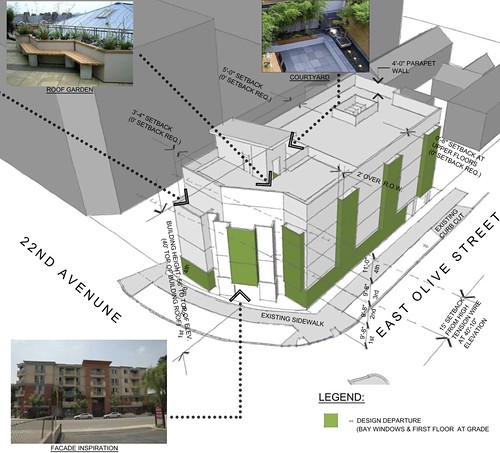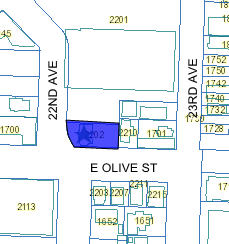
This is for an “apodment” style building with many small apartments with only bicycle parking provided on site (previous CD News article, with many comments). BTW more here on CHS about “micro-housing“.
“Early Design Guidance application for a four story residential building containing 45 units. Parking for 12 bicycles will be provided. Existing structures to be demolished.”
2nd EDG Project: 2202 E. Olive St.
Design Proposal available at review meeting
Review Meeting: August 15, 8:00 Seattle University Campus 824 12th Ave A&A Building (Admissions & Alumni Room)
 Review Phase: EDG–Early Design Guidance
Review Phase: EDG–Early Design Guidance
Project Number: 3013256 Planner: Shelley Bosler
Architect’s materials from July 11th Design Review meeting: http://www.seattle.gov/dpd/AppDocs/GroupMeetings/DRProposal3
Design Review report from July 11 meeting not yet available. Architects’s materials for August 15 meeting not yet available. http://www.seattle.gov/dpd/Planning/Design_Review_Program/Pr
Permit info: http://web1.seattle.gov/DPD/permitstatus/Project.aspx?id=301
UPDATE: this Design Review hearing is about the design elements of this particular project. There’s a much bigger issue of how the building code regulates these clusters of tiny apartments, and whether it should change. The ever thoughtful Bill Zosel, from the 12 Avenue neighborhood, summarized these issues in a comment recently. And this comment neatly summarizes the parking dilemma: we’re all eager to commute without cars, but most of us need a car to get out to enjoy the countryside that was one of the reasons we moved here.

This is not an apodment project. This is an apartment project, subject to the same design review regulations as any other. Your links to previous comments relate to an entirely different topic. How is our community expected to have an intelligent conversation about this type of housing and it’s impacts when our neighborhood blog can’t even get the facts straight? Misinformed articles like this ultimately do more harm than good.
If people want rental homes with no parking – this project will do fine. Not everybody wants a car. I like my SUV and live in a place where it almost fits. My next home will have room for more and bigger vehicles. Because I want that. Should we mandate that every home have room for three cars, a boat, two horses, a flock of sheep (aka methodists and unitarians), etc, etc. What’s wrong with choices? Why hate on affordable housing?
I think some of the concern is coming from people who don’t really believe the residents of these buildings won’t have cars. How many times have we seen a big old single-family home removed to uild a 4-plex of townhomes each with its own (small) garage, only to see the owners park on the street and make the parking that much worse for long-time owners of single-family homes? Like you, I bought my house in a residential neighborhood with street parking, and I understood I paid a premium for it. I’d be pretty upset if I suddenly saw multiple high-density apartment buildings sprout up for people who allegedly don’t have cars, only to see all the street parking disappear with these supposedly non-existent cars.
CDNews is a community website, and this post comes from a community member (who, clearly, has a point of view on the issue). Many posts are written by community members for community members.
That said, Andrew doesn’t have his facts wrong. “Apodment” is a particular company, but the their name is being used all over the city as a generic term for micro housing projects. This is a micro housing project.
However, this project is going before the Design Review Board, and one criticism of other similar projects was that they were getting a design review pass. You are right, that’s an important detail (which, again, Andrew does include).
An interesting read in support of similar projects: http://seattletransitblog.com/2012/08/13/what-apodments-can-
Andrew most certainly does have his facts wrong and you are doing a great disservice to your readers by perpetuating the confusion.
You are correct that “apodment” is a is a trade name. However, it has become the colloquial term for a very specific type of project. It is a subtle, but very real difference. Apodment buildings are built on LR3 zoned property and are exempted from design review because they contain very few units, but each unit has a number of bedrooms that are then rented out individually. The land use regulations are really not that different from those applied to single family homes.
Conversely, this project is being built on commercially zoned land and is subject to a completely different set of land use rules and regulations. This project is no different from any other traditional apartment building in how it is reviewed and permitted.
Apodment has become a loaded term in our neighborhood. There are very legitimate concerns (in my opinion) as to how those types of projects are reviewed and permitted. Our community should be talking the pros and cons of the apodment model. But in order to have an intelligent conversation we all need to have a baseline understand of what the terms mean. Calling this project an apodment is simply inaccurate and unfair.
I realize that 99% of the population may not understand or care about these differences, but to those who have dedicated their careers to improving Seattle’s built environment, the differences are very real and very important.
If you’re going to be lazy and play fast and loose with definitions, don’t expect to be taken seriously by DPD, the design community, our elected officials or anyone else who actually understands the issue. Articles like this don’t advance the conversation, they set it back.
In some neighborhoods people are not allowed to park on the street. Some even have ordinances where the owners cars must acutally be in the garage – no parking on the apron.
I’ve seen some pretty cool homes, but, the covenants and codes are so restrictive it would be hard to have guest. Planting a garden would be treason.
I like a community where you can make choices. If you have three cars – get a three car garage or deal with parking wars. I park one car on the street. If I didn’t have a car – I would be pretty upset about paying $200/month for a parking spot.
More people are coming. We are going to have to live with them. If I get despirate – their is a parking garage nearby that charges $35/month. It’s a three block walk, but, I walk by every morning any way. See – then I would be paying for parking my car, not the guy without one. If I want to work hard to find the last spot on the block I can. I could also get a smaller car to get more chances to fit in. It’s my choice.
The city would like to find other ways for me to pay them as well – like a milage tax. I hope they don’t. Gas tax already covers my contribution, and, the more environmentally friendly car I buy – the less tax I pay. It’s a great system. Let’s give people choices. Some can afford a three car garage. Others can’t afford a garage at all. $200 more per month could put alot of folks on the streets.
“Like you, I bought my house in a residential neighborhood with street parking, and I understood I paid a premium for it.”
No you didn’t. That street in front of your house belongs to me as much as it does to you. Yes, you benefit from it more than anyone else in the city, but you certainly don’t own it.
Everyone in this city pays to maintain that street parking space in front of your house, including people that don’t own a car. It seems pretty arrogant to claim this city propery as your own, and then to demand other people build parking spaces that they don’t even need just to be sure you won’t lose “your” spot.
Where did I say I owned the spot? I said I paid a premium– for my HOUSE- to be in a neighborhood that has street parking. And my property taxes are higher because the house is worth more because it’s somewhere that’s not as dense. I didn’t say I was entitled to the parking. But I sure do (indirectly) pay to upkeep the street in front of my house. Nobody else pays more towards it, either.
Following along on this comprehension-challenged theme– neither did I say that anyone should build parking spaces they don’t need. My point is exactly the opposite: if they claim they don’t need parking, and get different design concessions because of that– then hold them to it.
If these developments are approved on the pretense that they’re very small “apodments” for people who won’t have cars, only to find the they DO, the city has just relaxed the parking requirements that applied to other builders, under bullshit pretenses. Encouraging smaller homes so people w/o cars don’t have to pay for parking they don’t need is a great idea– IF they people really don’t have cars. In an extreme case if on-street parking gets so tight it cheapens the entire neighborhood, property values go down and so do tax collections.
If these get approved under the reasoning they don’t need parking, then hold them to it–something like making neighborhood decals required for on-street parking. Then don’t issue them to people who buy these homes who (allegedly) don’t have cars. If they really don’t, there won’t be a problem, right?
Both in the article and in the comments, adds a great deal of useful information to the discussion.
Pingback: Buying A Multi Family Home